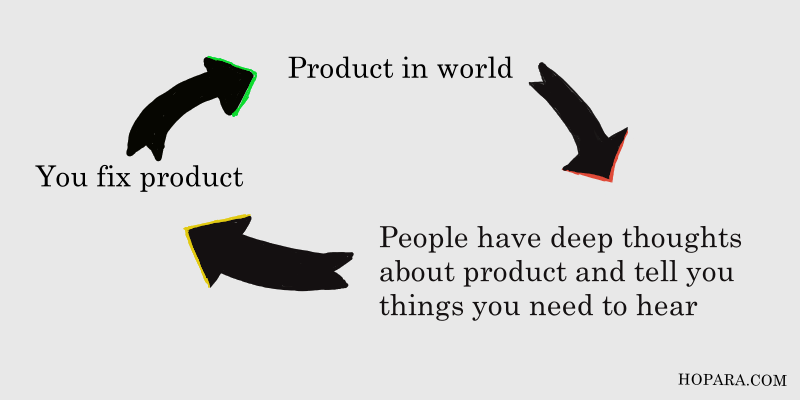Feedback Nebulae
Thanks for visiting! Subscribing is free – ad free, personal-tracking free, everything-free, and it unlocks the weekend posts as well (you know... like tomorrow's post). If this was forwarded to you, try it out! Plus, you get to ask me to write about and draw about things.
One of the enduring myths in business is that there's such a thing as a feedback loop. It generally looks like this:

The idea here is that you're always iterating your product, and you're always making it better. This is true in some places – notably software, which really does do this. But the rest of the world? Naw. When something's out there, it's out there, and you're not going to change it all that much.
There are places, such as digital content, where people go back and revise articles all the time, and those places will claim that they're using a feedback loop. I'm one of those people, and I can tell you: the places where it's actually worth revising something you put out into the world already are few and far between.
What I experience most days is a one-way street: I put stuff out into the world, and I get feedback on it in the form of responses to these posts or comments on social media. BTdubs, if you're looking for positive feedback, don't go on Imgur.
Here's the thing: sometimes, that feedback is super-helpful, like the many of you who asked me to start working more in color than in black-and-white. Other times, the feedback is like, "I don't get it and you suck."
There's a huge temptation to think of this negative feedback as one of two things: either it's incredibly valuable because people are telling me that my jokes aren't funny (definitely true more often than I'd like it to be), or it's totally useless because I have no idea if that person would ever like anything I do.
In reality, it's somewhere in the middle: people give feedback based on who they are, their mood, what they saw earlier today, how much sleep they got the night before, and so on. Most of their feedback has almost nothing to do with you. You're just the recipient of their mood.
This means that most things people say to you shouldn't be incorporated into what you're making, which is hard, because you're basically telling people to eff off every time they tell you something.
Instead, what I do, and what the companies I've run have done, is look for themes.
I don't generally post my stuff to social media because I think I'm going to gain a mass following; it's clear to me that takes years and that there's probably not even a good financial reason to put that kind of effort in. Plus, there is a pretty limited correlation between people seeing stuff on social media and interacting with a website.
I post on social media because the internet is a pretty knee-jerk, negative place that should be avoided at all costs... and that's the type of feedback I want to see.
I can run a series of drawings that I know are creepy (Plunderee, I'm looking at you) and see if people respond to that creepy, or just think it's weird (it's the latter). I can run through various types of scenes – animals, so...many...tacos, and people – with pretty similar ideas, and see what seems to resonate where, by day, and by what else is happening in the news and what people expect to see.
I can also see if people respond to things that are depressing, hopeful, just supposed to be funny, informative, or something else. It turns out that the magic formula there is at least three of those things together at once. It also turns out that calling people out for lying really turns people off (that post is the only one that lost me more than one subscriber). And that I shouldn't make drawings that take a decent amount of time to get the joke, like yesterday's, where lots of people didn't see the blue screen of death in the laptop, and even when they see it, it's not funny. Sigh.
This isn't a loop, though. I think of it as hundreds of different lines that look like they might converge somewhere, but are often in open conflict with each other. If there is a comparison to be made, it's that improving a product (in my case, posts and doodles) is more divination than pattern-seeking. If anything, it looks a bit like a nebula.
We spend so much of our work lives looking for frameworks that will make our lives easier without stopping to think about whether or not they should even work. Of course getting feedback is a muddled mess – everyone knows this. And of course you should incorporate it. But that doesn't mean you should simplify your view of it down to something that's circular when it actually looks like this:

Every star in that drawing is a piece of feedback. The big stars might be from the people you care most about, and the nebula is how you might triangulate that feedback into something actionable... but look at all of the stuff you're just going to ignore, and that should be ignored.
Is that nebula the right thing to focus on? I don't know. You don't know. No one really knows. At best, you get to keep triangulating until you figure out something that works better today than it did yesterday.
Thanks for reading!
This get sent to you, or your first time browsing? Made it here a few times? Subscribe for free to get these sent your inbox
